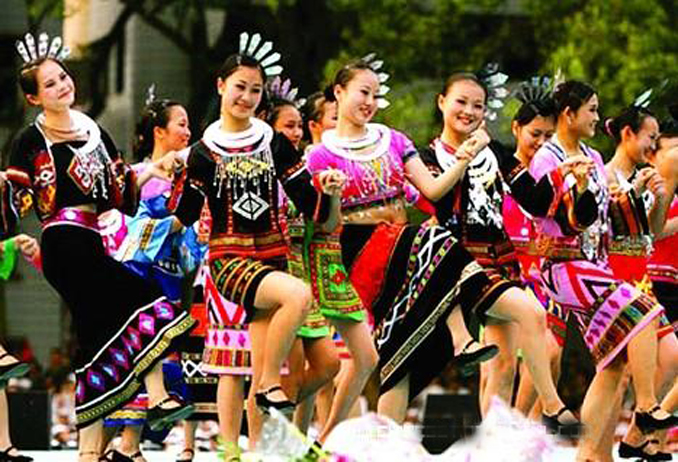Written by: Wei Liming
Posted on: December 11, 2014 | 
Zhuang Women at the Double Third Singing Carnival
The Zhuangs are China's largest minority group, with a population of about 16.2 million according to the fifth national census in 2005. The majority of these people live in the Guangxi Zhuang Autonomous Region and Yunnan province; the rest are scattered in the Guangdong, Hunan, Guizhou and Sichuan provinces. The Zhuang language is a branch of the Sino-Tibetan language family. In 1955, China developed and popularized a Zhuang language based on Latin alphabets.
The Singing Carnival, held on the third day of the third lunar month, is an important traditional festival for the Zhuang people, who are very fond of singing. Their place of residence is known as the "sea of songs" or the "soil floored with piano keys". Zhuang men and women begin to learn singing at the age of four or five years. They sing about love, work, sadness, happiness, celebration as well as mourning. They also sing to invite guests to drink at parties and to ask the gods to send rain for their crops. The Zhuangs even challenge each other's wit with antiphonal songs. The best known singers in Zhuang history, such as Liu Sanjie and Huang Sandi, are declared the "King/Queen of Singers."
 |
Liu Sanjie, the "Queen of Singers" in the Zhuang's history |
The Zhuangs gather to sing songs at the Singing Carnival, usually on the third day of the third lunar month. Research shows that there are 640 meeting sites for the Zhuangs in Guangxi. They also meet at the Spring Festival in mid-autumn or one month after the birth of a child. Sometimes they even arrange singing meetings on the way to the trading market.
Different kinds of songs are sung at different occasions. During the "singing meeting in the day", young people gather outside in the fields, singing to seek out their lovers. During the "night singing meeting," the songs sung are usually about work, life or historical events. Songs for different occasions must not be confused, especially at the time of marriage, worship, and death.
On the third day of the third lunar month, Zhuang people from hundreds of Ii (two Ii are equal to one kilometer) away, all dress up to meet and sing together. Often, men and women stand opposite each other and sing. Women assess the men’s talents and their overall personalities from their singing skills. Men bring gifts for the women of their desire, and the women in turn throw embroidered balls with gifts to the men whom they fall in love with.
 |
At some singing meetings, people bring colored eggs as well. Men and women grab one egg in each hand. If a man likes a woman, he tries to touch his egg with the woman’s egg. If she accepts, the woman will allow him to touch her egg, and if she rejects, she will grab her egg tight, not letting the man touch it.
Sometimes singing competitions are also held between villages. For instance, Village A would send a silk ball to Village B, challenging it in a folk song competition. According to the rules, Village B can only return the ball if it wins the game. If Village B loses the competition, the embroidered silk ball would stay with them. There would be more competitions every subsequent year until Village B wins.
You may also like: